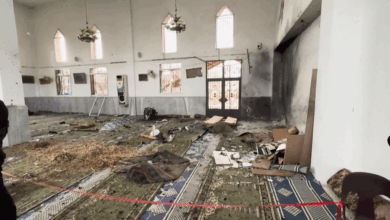A government official revealed that the creation of a new anti-terrorism law has been called off indefinitely.The source added that the government views the 29-year-old Emergency Law as sufficient for combating terrorism.
The official told Al-Masry Al-Youm that there are several factors that hinder the drafting of the law’s articles. He explained that the anti-terrorism laws of other countries–upon which Egypt’s proposed anti-terrorism law is based–suffer flaws.
The official claimed that political opposition groups vehemently object to the proposed law. He added that the Emergency Law, which was extended in May for another two years, already gives security authorities flexibility in handling terrorist incidents in terms of detentions and other procedures.
The same official refuted speculation that the recent Alexandria church bombing and al-Qaeda threats will prompt the government to hasten issuing the new law.
The new anti-terrorism law was part of President Hosni Mubarak’s electoral platform. He hoped to pass it by the end of 2010.
Some opposition groups and government critics believe the law would be a better alternative to the notorious Emergency Law, which has remained in place since the assassination of former president Anwar Sadat in 1981. The Emergency Law empowers security staff to stonewall non-governmental political activities such as demonstrations and formation of non-approved political organizations.
State Minister for Legal and Parliamentary Affairs Mufid Shehab declined to comment on the delay, saying that confronting current terrorist threats should remain paramount for the time being.
Fouad Allam, former vice president of Egypt’s State Security apparatus, stressed Egypt’s need for the anti-terrorism law, arguing that it gives security services the authority it needs for tackling terrorism. Allam admitted that the law would be insufficient on its own, pointing to political and social dimensions that should be taken into account when handling the issue. He dismissed allegations that the government abuses the Emergency Law for political purposes.
But Mustafa Bakry, a former independent MP who supports the proposed law, said he finds “no reason to leave President Mubarak’s pledge unfulfilled and not lift the state of emergency.” He said that the awaited anti-terrorism law would limit the power of security authorities. Bakry described the Emergency Law as the worst law in Egypt, saying that the state relies on it during elections.
The vice president of Egypt’s Court of Cessation, Ahmed Mekky, said that the country has no need for both emergency and anti-terrorism laws, contending that the Constitution’s penal codes impose sufficiently severe punishments for terrorist crimes.
“The Emergency Law empowers any police officer to detain whoever he pleases whenever he likes,” said Amr Hashem Rabea, an expert at al-Ahram Centre for Political and Strategic Studies. He added that the ongoing state of emergency is evidence of the state’s incompetency.




